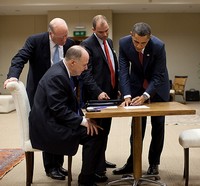On Sept. 11, 1990, U.S. President George H. W. Bush, in an address before a joint session of Congress, outlined his vision of a “new world order,” arguing that the end of the Cold War and the imminent launching of a multilateral military operation to liberate Kuwait from Iraqi forces offered the nations of the world “a rare opportunity to move toward an historic period of cooperation.” Events over the next several years seemed to validate his prediction: The ensuing First Gulf War offered a model for rules-based multilateral military interventions; the Madrid Peace conference raised the tantalizing hope that a general peace settlement for the Middle East might be in reach; and a “third wave” of democratization spread throughout Eastern Europe, Latin America, East Asia and parts of Africa. Over the same period of time, the Soviet Union collapsed while the European Union was born, and the World Trade Organization came into existence.
The optimism of the early 1990s was based on the assumption that globalization would knit the nations of the world into a global community espousing common values and shared interests, backed up by a rising tide of prosperity that would lift the boats of all nations and eliminate the need for zero-sum perspectives in world affairs. American statesmen also usually expected this process to be accompanied by an alignment of other nations with U.S. values and interests, with tacit support for Washington’s continued leadership of the community of nations. Writing in Foreign Affairs in 1997, Josef Joffe declared, “There is a much bigger payoff in getting others to want what you want, and that has to do with the attraction of one's ideas, with agenda-setting, with ideology and institutions, and with holding out big prizes for cooperation, such as the vastness and sophistication of one's market.”
But 22 years later, the elder Bush’s rhetoric, although faithfully echoed by subsequent U.S. presidents, sounds somewhat hollow:

